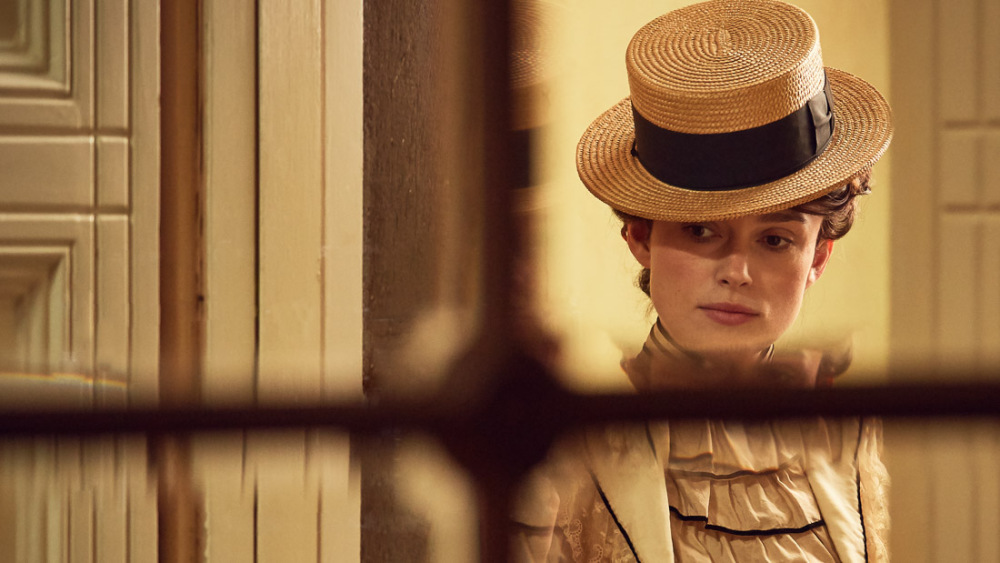
‘Colette’ indulges all the pleasures of the belle epoque
Written by: Lauren Humphries-Brooks, CC2K Staff Writer
Is there a better candidate for a biopic than turn-of-the-century French novelist/actress Colette? Her story has everything: sex, sadism, fancy clothes, a woman rebelling against patriarchal dominance, writing. Yet the center of Wash Westmoreland’s Colette is not really Colette herself (Keira Knightley) but her complex relationships, with men, with women, with society, and especially with her husband Willy (Dominic West), a notorious libertine and publisher of writing not his own.
The film opens with Colette and Willy’s courtship, as the much older man whisks the girl from her parental home in the French countryside to the questionable romance of fin de siècle Paris. Colette’s dreams of a romantic life are quickly punctured as she spends her days writing her husband’s correspondence or correcting his work – or, rather, the work her husband claims as his own. Willy runs a factory operation of writers who produce work under his name, an early exercise in brand recognition. The couple run through a series of booms and busts occasioned by Willy’s love of good living, good wine, and good sex. During one of their busts, Colette begins writing Claudine a l’ecole, a thinly veiled account of her schooldays, in an effort to contribute to her husband’s business. Willy comes to see his wife’s talent and soon she’s producing spectacularly successful novels, all published under his name, about Claudine’s coming-of-age. The film weaves in the romance and excitement of the fin de siècle as Colette begins to come out from under the shadow of her husband as they morph into a major celebrity couple.
Colette is awash in breathless adoration of the belle epoque, sweeping through the French countryside (beloved by Colette) and the stylish salons of Paris (beloved by Willy) with the intensity of an excitable tourist. We see flashes of Colette and Willy’s circle, and even more of their clothing, literature, and lifestyle. The fascination with aesthetics and fashion over developing characterization makes the film cloyingly superficial, avoiding digging down into the complexities of sexuality, gender relationships, and class that such a story demands. The narrative’s episodic nature means characters are introduced suddenly and just as suddenly vanish, coming into and out of the narrative like a sort of drive-by viewing of the turn-of-the-century.
Colette’s strength lies with its cast, not its structure, and to give it credit, it’s an excellent cast. Knightley strikes a believable note as a somewhat naïve country girl who transforms into a woman of the world, eager to investigate her nascent sexuality and her sense of self independent of her husband. Knightley finds fascinating nuance in a woman discovering the permutations of adult sexuality, of her anger in being used coupled with her need to be loved. Her Colette is a woman more talented, livelier than her male counterpart, angrier at being used and deceived than she is at Willy’s frequent infidelities. There are several scenes that would argue for an Oscar nod for Knightley if the film surrounding her brought her characterization more clearly into focus.
Acting as a buttress for Knightley is Dominic West’s Willy, a bon vivant, charlatan, glutton, frequenter of brothels, and yet also charming, likable in his chicanery, and a man who truly loves his wife, after his fashion. The film could have easily turned Willy into a pure antagonist who blocks Colette from achieving notoriety or uses her brilliance solely as a method of buoying himself up. But the script and West’s performance prevent that, instead couching Willy as a man who flexes himself outside the bounds of his society but who still holds a patriarchal, if largely benign, belief in male superiority. He considers the Claudine books a collaboration, and sees nothing wrong with taking her accomplishments. But he also tacitly recognizes her capabilities, and in time becomes supportive of them, so long as they’re enriching him.
Willy and Colette’s dichotomous relationship feeds into the film’s general themes of gender and sexual relationships, sometimes explored, sometimes given short shrift. For a film so concerned with the flexibility of gender and sexuality, Colette largely avoids sex scenes, limiting itself to brief shots of tactfully clothed bodies and somewhat coy conversations about the characters’ desires. The women with whom Colette becomes involved are objects of exchange between the husband and wife, a connection between them that sets them at odds. This is complicated further when Colette meets Mathilde de Morny (Denise Gough), an aristocratic woman who dresses and acts as a man (this long before being transgender was even a word). The pair fall in love and de Morny pushes her to consider her desires and life independent of her husband. Some of Colette’s most striking arguments come into focus here, depicting the flexibility of sexuality and gender we often don’t expect from historical films. Colette shoves back against Willy’s dominance in their professional as well as their sexual lives, but this shift comes too late in the film. Colette wants to deal with issues of gender and sexuality, but it cannot seem to reconcile that with its apparent desire to tell a straightforward biographical narrative.
Colette is ultimately a mixed bag, a film that needs a cohesive narrative arc and a deeper engagement with the concepts it introduces but fails to entirely tease out. It stands above a number of other contemporary biopics, even if it falls into the usual traps of applying a writer’s work as exclusively analogous to their lives (at least with Colette, there is some historical basis for that). More than anything, though, Keira Knightley finally proves she has the strength of character and screen presence to carry a film. If Colette has nothing else to recommend it, that alone would make it worthwhile.
